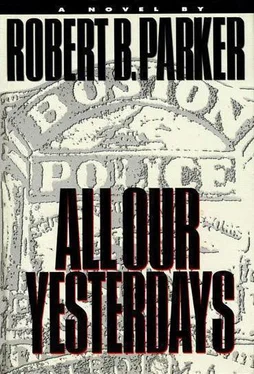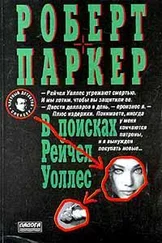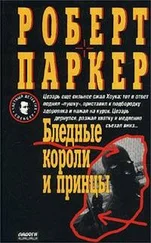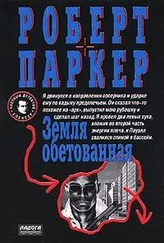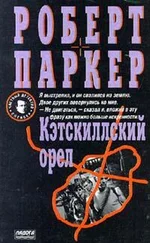And he was still motionless when they came for him. A RIC car came up the north side of the square and a lorry full of Auxies came down from the other direction. They were around him before he could move. If he had wanted to move. Which he didn’t. He made no effort to draw either of his handguns. He made no attempt to run. He stayed rock silent, deep inside himself, ballasted with resolve, nearly impervious to anything other than his romantic resolution.
They took his weapons and handcuffed him. A RIC officer went to the house and brought Hadley to the door. He pointed at Conn, she nodded. He looked implacably across the street at her. Their eyes met. She held his gaze for a moment, nodding as the officer spoke. Then she turned and went back into her house and closed the bright blue door.
“‘He knew when he kissed this girl, and forever wed his unutterable visions to her perishable breath, his mind would never romp again like the mind of God.’”
“You talking about your grandfather or about yourself?” Grace said.
“I’m talking about Jay Gatsby,” I said.
“Sure.”
“And Conn Sheridan.”
“Un-huh.”
“And me.”
Grace didn’t say anything for a while. We sat in the bright room surrounded by the dark storm with the careful space between us on the couch and thought about our situation.
“Tell me a little more about you and me and the perishable breath business,” Grace said.
“You know the story,” I said.
“ The Great Gatsby ? Yes.”
“It’s about a lot of things,” I said. “But certainly it’s about obsession.”
Grace nodded. I could hear the wind outside the condo. It was an odd juxtaposition of forces. The strong wind driving snowflakes so saturated that they flattened softly against the window, making no sound.
“And you’re obsessed?” Grace said finally.
“With you,” I said. “Or I have been. It runs in the family.”
“Not love?”
“Sure, love too, that’s what makes it tricky. To separate out the obsession and the love. And keep one, and deep-six the other.”
“And you’ve been able to do that?”
“Yes.” I smiled at her. “It’s my turn. One Sheridan a century.”
“Could you describe the obsession a little for me?”
“I was in love with love,” I said.
“Rather than with me.”
“Yes.”
“Which is to say you used me to fulfill yourself.”
“Yes.”
Grace thought about it, her face serious and beautiful, with the first hints of maturation showing in the laugh lines around her mouth. The white sweater was wide at the neck and I could see the definition of her trapezius muscles. Most women had none, and their necks and shoulders always looked a little angular to me. I knew she’d be even better looking when she was older.
“That seems a better deal for you than for me.”
“Yeah, it was, in the sense that I had to have it. But it was also like the myth about the guy up to his neck in water who was dying of thirst but couldn’t drink because when he did the water dipped out of reach.”
“Meaning?”
“Meaning I couldn’t get you to love... no, not love... I couldn’t get you to enter the obsession.”
“I’d have disappeared,” Grace said.
“Yeah, but the obsession would have been complete,” I said.
She smiled.
“How nice for you,” she said. “And you’re not obsessed anymore.”
“No. Now I love you.”
“How can you be so sure?”
I took in some air slowly, and let it out, and felt all right.
“Because I can leave you,” I said.
“Do you plan to?”
“No. I plan to let you see me and where I come from and who I’ve become and ask you to marry me. If you can’t, then I’ll be sorry, and I’ll say good-bye and find someone who can marry me.”
“Would you really?” she said. Her eyes seemed bigger than they had been and there was a sense of kinesis behind her calm face.
“I love you. I’d miss you for a while. But, yes, I will.”
“And you can live with that?” Grace said.
“After last fall, I can live with anything,” I said. “Happily and well.”
The gray granite walls of Kilmainham jail were six feet thick. The windows narrowed like gunports and were placed so high that at six feet two inches, Conn could just reach the window ledge with his fingertips. Gas jets sputtered feebly, flaring occasionally and falling back so that the flame was barely a blue glimmer above the nozzle. The door to his cell was iron, with a small peephole in it. Through the peephole Conn could see the length of cells on the other side of the corridor. A stench came from the rarely flushed jacks, out of his vision, at the far end. Men who had to use it were escorted by a military policeman from a Welsh regiment. He carried his revolver in his hand as he walked them there and back. The stone chill of the jail was penetrating, and Conn was cold all the time. There were some dirty army blankets in a pile on the floor, but they were inadequate. Everything was inadequate to the impersonal weight of the British Empire. Beneath this vast pile of disinterested stone, Conn was a buried fleck of rubble in the blank cell where Hadley had put him.
His first night Conn slept badly, shivering on the floor among the blankets. In the morning a prison orderly came down the corridor yelling, “Burgoo up, burgoo.” Conn got a cup of thick soupish tea and a chunk of bread. Later he was taken to the yard. It was narrow, with high walls, broken by very small barred windows where occasionally featureless faces looked out from cells indistinguishable from Conn’s. The underfooting was gravel with occasional patches of weedy grass breaking through. The other prisoners walked with him, single file back and forth across the small space in a half circle. No talking was allowed, but some took place anyway. The older prisoners had learned to speak without moving their lips.
“Where you from?”
“What have they got you for?”
Conn didn’t answer. They often put informers among the prisoners. Silence came easily to him anyway, for he was still deep inside himself.
There was no organization in the prison population. The British kept them as separate from one another as possible. Occasionally they were put in an identity lineup, brought to the yard, and paraded before anonymous witnesses inside a closed zinc box with a viewing slit in it. A cardboard sign with a number on it was hung by a string around each prisoner’s neck.
They would try Conn and hang him. He knew that. But first they would attempt to pry the names of others from him. They had not as yet. They were letting him soak in the despair of the jail.
A priest brought him an egg and showed him how to beat it first and pour his tea over it. It made the tea taste as if there were cream in it.
To protect themselves from bombs, the British took hostages from the jail. A prisoner rode in each truck with his hands tied to a steel bar above him. In one truck a sign that said, BOMB NOW, was hung around a prisoner’s neck.
Down the corridor from Conn a prisoner named Kenneally sang loud songs of Irish heroism. Someone next to Conn would chime in with alternate verses. The guards screamed at him, “Shut your fucking hole.”
When the singing continued, the guards charged down the corridor to Kenneally’s cell. When they got there it was silent. But behind them in another cell the song picked up. And a voice from still another cell called, “I’m here, Mary Ann, I’m here.”
He was given some books, but he didn’t read them. A newspaper was slipped under his door one day but he let it lie, and when the guards saw it they took it away.
Читать дальше
